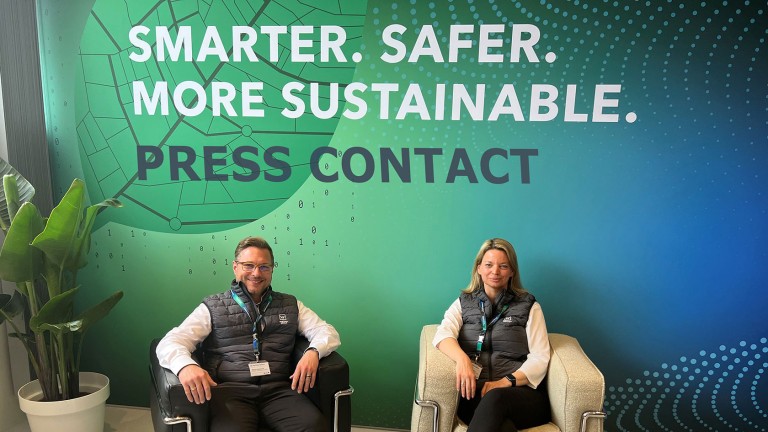Reducing the carbon footprint in asphalt production
New MULTI JET burner generation at Bauma 2025
At Bauma 2025, Benninghoven will be focusing on pioneering technologies for increasing efficiency. To increase sustainability in asphalt production, this specialist for asphalt mixing plants offers a variety of innovative solutions that address areas like the reuse of asphalt, reduced-temperature asphalt production, dedusting systems, and the use of hydrogen as a fuel of the future.
Zero-carbon asphalt production with 100% green hydrogen
In Munich, Benninghoven will be taking the wraps off its MULTI JET burner generation and the MULTI JET Control burner control. This new burner generation is capable of using four separate fuels at the same time and independently of their aggregate state – whether solid, liquid, or gaseous. Alongside new plants, the burners can also be used in retrofit projects and independently of the original plant manufacturer.
One key feature of the MULTI JET burner is its mixed firing, which enables the simultaneous use of hydrogen, LPG, HVO, renewable methane, and natural gas via separate nozzles. Switching between the fuels is completed on the fly, without involving any shutdowns or outages. The system therefore ensures a reliable supply of various fuels and offers plant operators a great deal of flexibility for selecting the least-expensive and most readily available energy source. This is a significant factor in the reduction of operating costs – also in light of future carbon pricing.
In addition, the new burner generation has also reduced noise emissions by 5 dB(A) – effectively halving the loudness as perceived by the human ear. Electrical power consumption has also been reduced by 20% for the same feed capacity.
Benninghoven dedusting solution optimizes asphalt production
With this new dedusting system, the specialist for asphalt mixing plants provides another solution that actively contributes to sustainability and process quality in asphalt production. Dedusting systems optimize the trouble-free operation of asphalt mixing plants. The dust created by the mixing process – especially aggregate particles and bitumen vapors – needs to be extracted and filtered efficiently. Nor is this only relevant for the plant processes but is also subject to stringent government regulations in terms of emissions. Many countries and regions worldwide are now tightening these regulations, which makes effective dedusting solutions even more attractive.
The new dedusting system is characterized in particular by its flow-optimized design, positive overall energy balance, low residual dust values, high process reliability, large filter surface area, and maintenance-friendly access points.
Maximum recycling: boosting profits with the recipe generator
Maximum recycling aims to enable the reuse of high-quality materials and therefore retain or even improve on the original material quality. Another advantage of maximum recycling is its significant reduction in carbon emissions. Studies have shown that using 60% recycled material can cut carbon emissions by up to 20%.
Alongside technologies and Retrofit solutions like the hot-gas generator, REVOC system, and cold feed systems, the recipe generator plays a decisive role here. As an optional software extension for the Benninghoven BLS 4 plant control system, the recipe generator significantly enhances recycling management in the asphalt mixing plant and enables maximum recycling feed rates per metric ton of finished asphalt. The recipe generator also offers the option of mixing multiple RC types (asphalt granulates) together, so as to most closely approximate the grading curve of the type of asphalt to be produced. The maximum proportion of recycled material is calculated while accounting for the target product, external parameters, and plant configuration.
In terms of the bitumen type, this also involves either switching from a hard to the next-softer binder or blending, as appropriate, as the RC proportion rises, so as to stay within the constraints given for the required softening point.In this way, the recipe generator allows the dynamic adjustment of the RC proportion in steps of 1%. All of the components required are adjusted automatically according to the current RC proportion. Ongoing production is not interrupted and a recipe change is also unnecessary (1 recipe for 1 asphalt type).
Reduced-temperature asphalt cuts carbon emissions significantly
The drying and heating processes for virgin mineral and recycling material are particularly energy-intensive in asphalt production. Fuel and emissions can be saved if authorities and owners prioritize reduced-temperature asphalt types. This is the term used to describe asphaltic mixtures with a final temperature of about 120 °C (248 °F). This is a reduction of around 30% compared with conventional mixtures, which usually need to be around 160 °C (320 °F). This offers major potential for reducing energy and carbon: 18,000 kWh and 6 t of carbon are saved in the production of 2,000 t of asphalt – on a daily basis.
Benninghoven asphalt mixing plants offer three innovative approaches for the production of reduced-temperature asphalt: the addition of solid or liquid additives, and the use of water as an auxiliary material.
With the help of the Plug & Work System, the components can be integrated into existing mixing plants or retrofitted, with the aim of enabling flexible and resource-friendly production. Foamed bitumen in particular is interesting as a binder for producing reduced-temperature asphalt, as it requires only one auxiliary material: water, which is already available at any asphalt mixing plant. The released surface energy ensures that the binder moistens the mineral very well during the mixing process even at low temperatures, temporarily generating installation properties that are comparable to those of hot asphalt. Reduced-temperature asphalt therefore makes a decisive contribution to reducing PAH (polycyclic aromatic hydrocarbon) emissions during asphalt installation.
Ciber technologies for continuous asphalt production and mobility
Industry delegates attending the Benninghoven exhibition area can also find out about technologies from Ciber at the trade fair booth. In Munich, this specialist for continuous asphalt production will be showcasing solutions with which users can also implement an efficient and mobile continuous mixing process. As can be seen, Wirtgen Group covers the entire bandwidth of sustainable and cost-efficient solutions in asphalt production.

Public Relations
Reinhard-Wirtgen-Straße 2
53578 Windhagen
Germany



